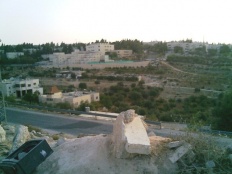- About
- News
-
Advocacy
- Accountability & Litigation
- International Advocacy
- National Advocacy
- Documentation
- FAI Unit
- Al-Haq Publications
- Library


- About
- News
-
Advocacy
- Accountability & Litigation
- International Advocacy
- National Advocacy
- Documentation
- FAI Unit
- Al-Haq Publications
- Library
In the past week, Al-Haq documented approximately eight incidents of settler violence in Hebron, Nablus, Ramallah and Bethlehem. The incidents included attacks on Palestinian agricultural land, the uprooting and burning of olive trees and both verbal and physical assaults on Palestinian civilians.
Muhammad ‘Ali al-Qeimary – Hebron
Muhammad, 47, lives with his wife, Ramziyya, 45, and seven children in Wadi al-Husein area in Hebron. Their neighbourhood is located approximately 250 metres away from the fence that encircles the settlement of Kiryat Arba’. Almost 10 years ago, settlers set up a tent to be used as a synagogue on Palestinian-owned land to the north of Muhammad’s house.
![Wadi al-Husein area next to the settlement of Kiryat Arba' . [photo credit to www.palestineremembered.com] wadihusein](/cached_uploads/resize/400/200/alhaq_files/images/stories/Images/2012/wadihusein.jpg) On 25 October, at approximately 5:00 pm, Muhammad, his wife, and their four-year old daughter, Aya, were walking back to their house. They passed the tent-synagogue, where hundreds of devout Jews and Israeli settlers had gathered for a religious ritual. When the family was approximately 30 metres away from the tent, a young settler approached them and repeatedly spat at them. The young settler also verbally insulted the family. Muhammad responded in Hebrew saying “Shame on you. Remain quiet.” The young settler then swore at the family loudly, drawing the attention of some of the other settlers, who began congregating around Muhammad and his family.
On 25 October, at approximately 5:00 pm, Muhammad, his wife, and their four-year old daughter, Aya, were walking back to their house. They passed the tent-synagogue, where hundreds of devout Jews and Israeli settlers had gathered for a religious ritual. When the family was approximately 30 metres away from the tent, a young settler approached them and repeatedly spat at them. The young settler also verbally insulted the family. Muhammad responded in Hebrew saying “Shame on you. Remain quiet.” The young settler then swore at the family loudly, drawing the attention of some of the other settlers, who began congregating around Muhammad and his family.
Tens of Israeli soldiers were located in the area, some of whom arrived on the scene shortly after the interaction between the settlers and the family began. One soldier attempted to separate the settlers from Muhammad and his family, but failed. In the meantime, one of the settlers called on the other settlers to beat Muhammad and his family and spray them with gas. The couple continued walking, but the settlers followed them and started beating them. At that point, Muhammad’s son, Khaled, 23, who is intellectually disabled, arrived on the scene. The settlers began beating Khaled, who hit them back in retaliation. Shortly afterwards, the Israeli soldiers succeeded in separating the settlers from the family.
As the family reached their neighbourhood, a female settler approached Ramziyya and attempted to pull her headscarf off, but Ramziyya was able to retain it. The same settler that had incited violence against the family previously, called on the other settlers to “Beat them!” In response, a settler sprayed an orange-coloured gas at the couple, while another settler violently hit Ramziyya’s neck. Ramziyya almost lost consciousness but her Palestinian neighbours provided her with a chair and some water. By that time, Muhammad’s children had escaped to their house and the Israeli soldiers had again managed to separate the settlers from the couple.
Muhammad recalls that during the attack around 50 settlers surrounded the family and that the incident had lasted almost 10 minutes in total. After the attack, the Israeli soldiers sent for a Palestinian ambulance to provide medical aid to Muhammad and Ramziyya. The couple was admitted to the Hebron Governmental Hospital. Muhammad suffered from pain in his chest and Ramziyya from pain in her neck. The couple also both had bruises on their bodies and complained of soreness in the eyes.
On 27 October, the couple went to the Israeli Police Station to file a complaint against the settler attack. They met with an Israeli detective who informed them that the settlers had already filed a complaint against them, alleging that Muhammad and Ramziyya had sprayed gas at the settlers. (Al-Haq Affidavit No. 9090/2013)
Al-Haq expresses its grave concern at the increased levels of settler attacks against the Palestinian civilian population. During the 17th Session of the Universal Periodic Review of Israel, held in Geneva on 29 October 2013, Israel was criticised for the climate of impunity in which settlers carry out violent attacks against Palestinians and their property. Continuous and widespread incidents of settler violence illustrate how Israel fails to abide by its obligations under international law to protect the occupied Palestinian population.
